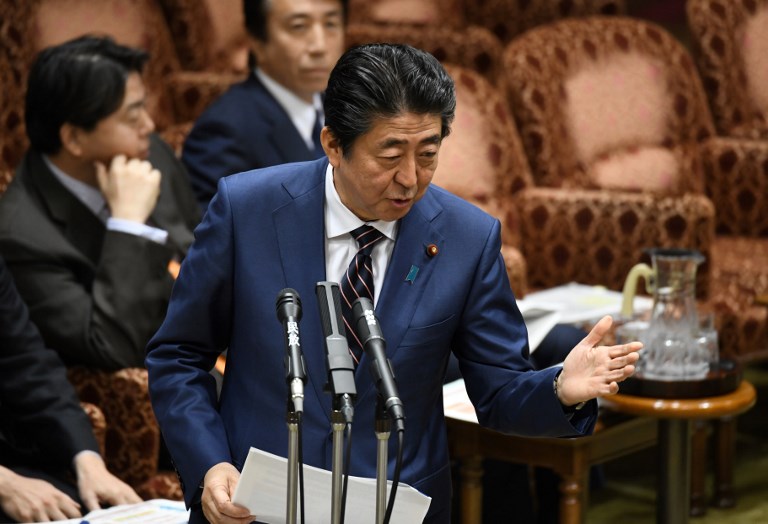English-Français
អន្តរជាតិ

×![]()
ដោយ: AFP
Tokyo, Japan | Prime Minister Shinzo Abe's long-held dream to change Japan's pacifist constitution is high on the agenda after he secured another term as head of his ruling Liberal Democratic Party on Thursday.
Nationalists like Abe dismiss the constitution as a humiliating relic imposed by US occupiers after Japan's defeat in World War II, while regional tensions with North Korea focus the country's mind on security.
But many Japanese feel strongly attached to the document's pacifist ideals and reform is far from a top issue.
Any tentative move towards what critics call "re-militarisation" would trigger alarm bells in China and the Koreas, given Japan's history of military aggression in the region.
Here are some facts about the document and the tough job Abe will have in trying to change it:
Q: What's so unique about the Japanese constitution?
A: It was drafted by the US during its occupation of Japan after 1945, with an eye to quashing Tokyo's ability to engage in another conflict.
Its most unique feature is Article 9, which commits Japan to renouncing war and forsakes the use of force as a means of settling international disputes. It also bars Tokyo from maintaining a military.
Despite this, Japan actually has one of the world's best-equipped militaries, called the Self-Defense Forces (SDF), whose stated aim is to defend the nation in case of attack.
Q: How and why does Abe want to change the constitution?
A: Abe wants to change the wording to affirm Japan's right to a military, ending the paradox that the SDF should constitutionally not exist, although it has for decades.
The premier has stressed he would keep the clause that prevents Japan from waging an offensive war.
While his proposed changes may seem minor, it moves Japan closer to Abe's eventual goal of turning the SDF formally into a regular standing army, which would set nerves jangling in Beijing, Seoul and Pyongyang.
Abe has already brought in controversial legislation that allows the SDF to fight alongside allies in certain circumstances.
Critics say the constitutional changes are not needed since the SDF have long been accepted by the public.
Q: How do you change a Japanese constitution?
A: The current rules impose high hurdles on amending the constitution, so Abe will have his work cut out.
A draft amendment can be tabled only with the support of either 100 members of the lower house of parliament or 50 upper house lawmakers.
That draft needs to win two-thirds of the vote in each of the two chambers before being put to a national referendum, which is decided by simple majority.
Q: Do Japanese people want to change the constitution?
A: Public opinion is split on the issue, but few see it as a priority.
Survey after survey has shown the majority of voters want to keep the pacifist ideals outlined in Article 9, despite Pyongyang's provocations and an increasingly assertive China.
A poll by public broadcaster NHK earlier this year showed 31 percent of respondents agreed with the prime minister's bid to officially recognise Japan's military in the constitution, while 23 percent opposed the idea. Forty percent were undecided.
Social security and the economy topped voters' concerns, according to a separate poll conducted by the Asahi Shimbun in early September.
Q: Can Abe succeed?
A: His ruling coalition and like-minded conservatives won enough lower house seats in last year's general election to start the process of drafting a new constitution or making changes to the existing one.
While Abe is keen to begin revising the document later this year, the LDP's junior coalition partner Komeito says there is no need to be so hasty.
Abe has aimed to revise the constitution in three years but even pro-change lawmakers are divided on the specifics, which could slow progress.
Conservatives are also keen to ensure their first attempt at changing the constitution ends in success.
Abe himself has struck a cautious tone, saying: "I would like as many parties as possible to approve."
bur-si/ric/qan
© Agence France-Presse
© រក្សាសិទ្ធិដោយ thmeythmey.com






















